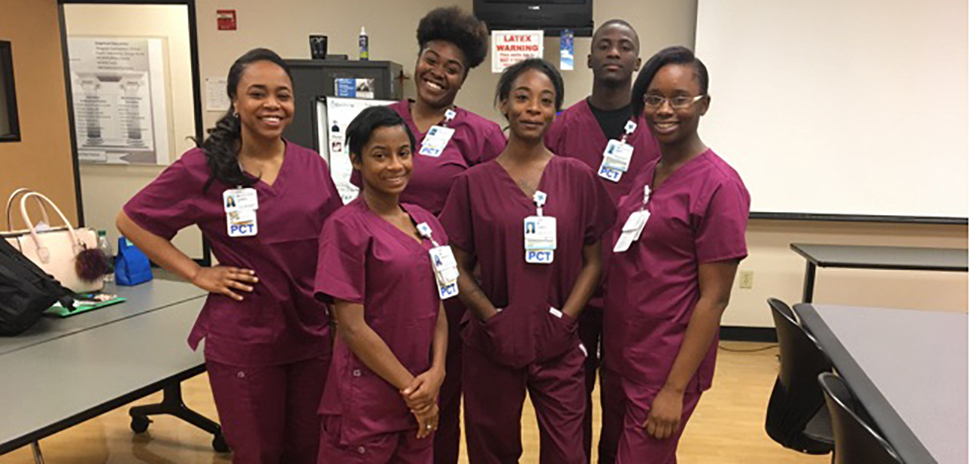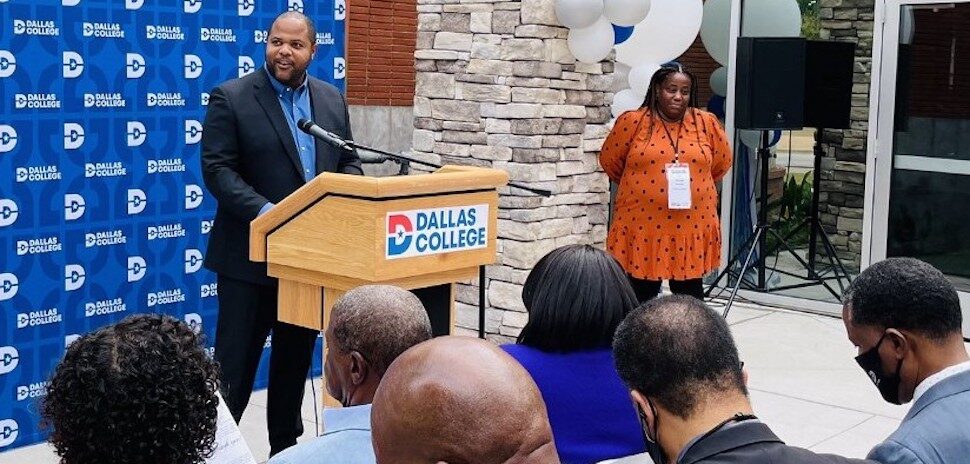West Dallas resident and Army veteran Reon Thomas has held many jobs — packager, restaurant server, security worker — but none resonated with him or gave him opportunities for career growth to support his budding family, he said.
Through a new public-private program partnering Serve West Dallas, Baylor University Medical Center at Dallas and others such as Dallas County Community College District, City of Dallas Office of Economic Development, Anthem Strong Families and United Way of Metropolitan Dallas, Thomas finally feels like he’s carrying out his aspirations to serve people as a BUMC patient care tech. And, for once, the 23-year-old sees a pathway to a higher-paying job.
“This is the first job that I actually go to work and I’m not anxious or frustrated with it. I’m just happy to go,” Thomas said.
The West Dallas Middle-Skills Career Pathways in Healthcare Initiative seeks to lift young women and men like Thomas from underserved areas in West Dallas into middle-skill careers in health care.
“The idea is not to just give them a job. The idea is to give them a career.”
Scott Hanson
They’ll start with an entry level position at BUMC such as operating room tech, patient care tech, or unit secretary. Then, program organizers hope to guide them through certifications and education to reach those middle-skills positions.
“The idea is not to just give them a job. The idea is to give them a career,” said Scott Hanson, executive director and chief resource officer of Serve West Dallas.
Beyond job training, participants ages 18-24 receive mentorship and case management to address socioeconomic and emotional issues that could be preventing them from staying employed.
“What’s happening today is people coming out of the under-resourced environment, they lack a lot of family support or support systems. You have to create the support system to help them be able to hold a job,” Hanson said.
HEALTH CARE AMONG TOP SECTORS FOR JOB DEMAND
The West Dallas Pathways program is two years in the making.
Serve West Dallas, an umbrella nonprofit uniting area organizations to fill gaps in resources and encourage collaboration, first engaged community partners shortly after a 2015 meeting discussing the findings of JPMorgan Chase & Co.’s Strengthening Dallas-Fort Worth: Building A Middle-Skill Pipeline to Sustain Economic Growth and Expand Opportunity report.
In the report, Chase outlined a growing need for middle-skill workers in the Dallas-Fort Worth area especially in health care and information technology.
Between 2013-2014, those two sectors led middle-skill job demand in the area with nearly 40,000 open positions, according to the report. Middle-skill jobs require more education than a high school degree, but not necessarily a bachelor’s degree.
Between 2013-2014, health care and IT led middle-skill job demand in the area with nearly 40,000 open positions, according to the report.
To meet the demand and sustain economic growth, Chase suggested preparing more low-income and low-skill individuals to step into those positions perhaps through some sort of career pathway program.
Thomas is part of a pre-pilot cohort which started earlier this year aimed to test the viability of such a program in the West Dallas area.
“Some of them go off to a four-year college and have success, but some of them aren’t necessarily going to be on that path to a four-year degree. They still need to make a living wage,” said Serve West Dallas Managing Coordinator Lexie Okeke of young adults in West Dallas.
The official two-year pilot of the West Dallas Pathways program, backed partially by a $375,000 service agreement from the city of Dallas, will begin Wednesday with 14 participants.
PROGRAM TAKES IT DOWN TO INDIVIDUAL RISK LEVEL
In the first 90 days of the program, participants go through risk assessments, soft skills training, and work with a case manager from Anthem Strong Families to address any challenges they may have. Through a partnership with El Centro College, they’ll also start earning certifications such as CPR training, which they’ll need to step into entry-level positions at BUMC.
“It’s just not another workforce development program,” Hanson said. “This program takes it down to the individual risk level of each person that we take into the program.”
Thomas said he’s learned more about himself like why despite being an outgoing, hard worker, he can sometimes lose motivation.
“The program is really structured in such a way that it targets that weak spot you have and strengthens it,” Thomas said.
Thomas and his wife also welcomed their son two months ago and program organizers helped them out with clothes and other essentials for the baby.
“It’s more than just a job program. It really helps you out with life skills — anything you need.”
Reon Thomas
“It’s more than just a job program. It really helps you out with life skills — anything you need,” Thomas said.
Once on the job at BUMC, participants are paired with a chaplain from the hospital’s Office of Missions and Ministry for weekly mentorship sessions from day one.
Working in health care can be stressful, said Mark Grace, chief mission and ministry officer for Baylor Scott & White Health. Employees deal with patients who might be facing a live-changing diagnosis or in severe pain every day, he said.
“With this program being involved with them as mentors, we are able as they start to get acclimated to all that intensity, [to give them] a corresponding amount of support — spiritual, emotional, and practical — in dealing with the stress of working in health care,” Grace said.
REDUCING TURNOVER RATES; REPLICATING THROUGHOUT BAYLOR SYSTEM
Grace, who has volunteered with his wife in his personal time to give young West Dallas residents a stable environment to live, said he hopes the West Dallas Pathways program can help reduce the turnover rates the hospital experiences.
Hanson wants to reduce annual turnover rates for entry-level positions from 40 to 20 percent, he said.
“The young people that are in this pilot, are not essentially different than the people that are coming to us for hire every day. … We’ve slowly and progressively come to understand more in health care that if someone comes to you out of a context of living in an underserved community, that has direct impact on their ability to maintain employment,” Grace said.
Grace hopes to eventually expand the program into other hospitals within the Baylor Scott & White system.
“West Dallas is serving as a great laboratory to develop a program that I’m hopeful we can carry to other places,” he said.
“West Dallas is serving as a great laboratory to develop a program that I’m hopeful we can carry to other places.”
Mark Grace
Five years from now, he’d like to see participants receiving more education and advancing their careers.
Thomas said he’s thinking about becoming a nurse or respiratory tech. He’s been able to ask questions with people currently in those jobs to get a real-life perspective.
For now, his role as patient care tech has been rewarding.
“I’m helping people. I’m making peoples’ day. This could be the worst times of their lives, so I get to be a part of that and brighten their day,” Thomas said.




























